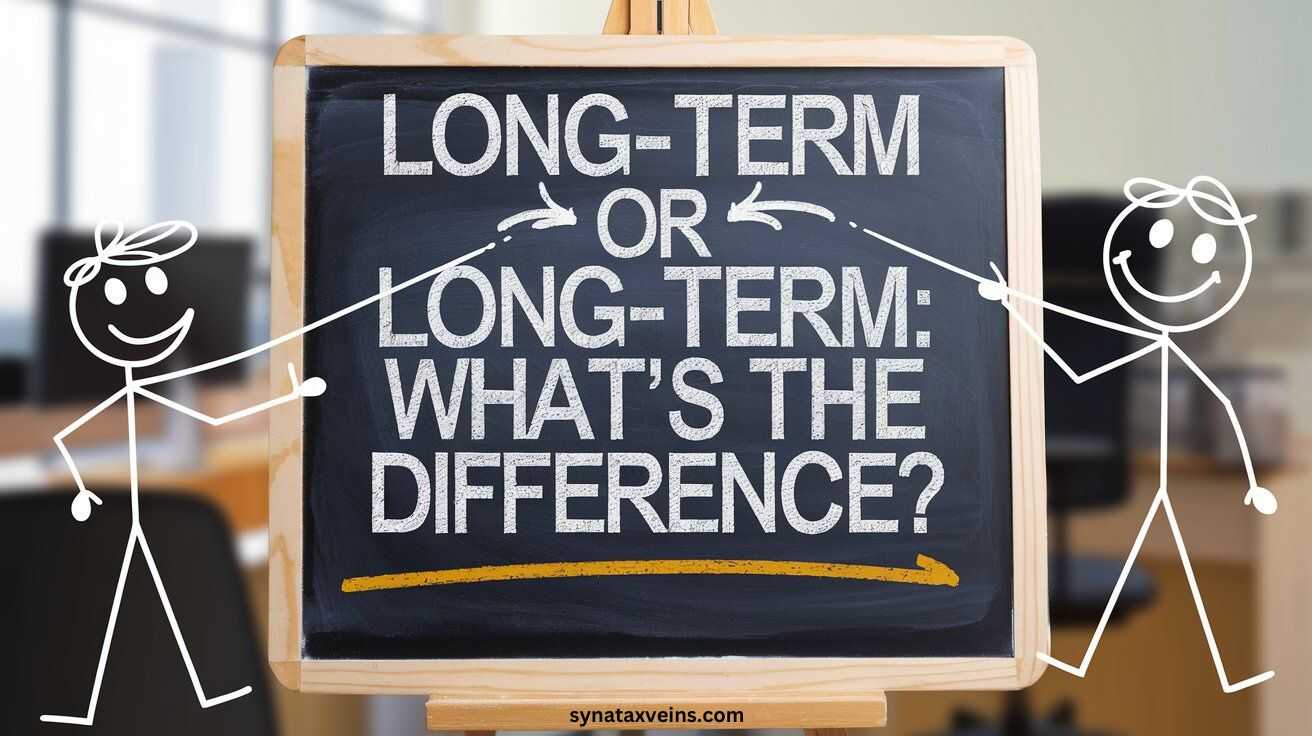Understanding the correct usage of longterm or long-term is essential for clear communication. Many people confuse these terms, but knowing when to use them can improve writing clarity and sentence structure.
This guide will explain the meaning, usage, and differences between long term, long-term, and the incorrect form LongTerm. We’ll also explore common mistakes, grammar rules, and best practices for future planning in both professional and casual writing.
Quick Summary
- Long term (two words) is a noun phrase referring to an extended period. Example: “She is thinking about the long term.”
- Long-term (hyphenated) is an adjective usage describing something lasting a prolonged time. Example: “This is a long-term project.”
- LongTerm (one word) is incorrect and should not be used in standard English.
Knowing when to use each form ensures writing clarity and improves communication in strategic planning, financial targets, and business growth discussions.
Understanding LongTerm or Long-Term
The English language follows specific grammar rules when forming compound words. Some phrases remain separate (noun phrase), while others need a hyphenated word for correct sentence structure.
Misusing long term and long-term can lead to confusion. Writers often struggle with whether to hyphenate, especially when discussing future planning, investment strategy, or sustainable growth.
What Does “Long Term” (with space) Mean?
The phrase long term acts as a noun phrase. It refers to an extended period in time management, business longevity, and career aspirations.
Examples:
- “She is focused on the long term, not just short-term results.”
- “Investing for the long term helps with wealth planning and financial literacy.”
This form should not be used as an adjective. Instead, add a hyphen when modifying a noun.
What Does “Long-Term” (hyphenated) Mean?
The hyphenated word, long-term, functions as an adjective. It describes a commitment, goal setting, or future objectives that last for a prolonged time.
Examples:
- “He made a long-term commitment to his company expansion.”
- “Long-term investments yield better future rewards.”
Always hyphenate when the term comes before a noun. This prevents confusion and ensures proper sentence structure.
READ MORE >>> Eventhough Vs Even Though: What’s the Difference?
Long Term: Definition and Usage
The phrase long term is commonly used in business growth, strategic planning, and money management. It helps describe a sustained effort toward a lasting impact.
Common Uses:
- Financial planning: “Good money management requires thinking in the long term.”
- Career goals: “Long term success comes from consistent effort.”
- Health and wellness: “A balanced diet is essential for the long term.”
Synonyms for “Long Term”
- Extended period
- Future-oriented
- Prolonged time
- Lasting achievements
- Enduring change
Using these synonyms improves writing clarity while keeping the message strong.
LongTerm: Definition and Usage
The term LongTerm as one word is grammatically incorrect. It does not follow English writing tips and should be avoided in professional business growth discussions.
Synonyms for “LongTerm”
Since LongTerm is incorrect, replace it with proper alternatives:
- Long-term plan
- Extended period
- Sustained effort
These phrases align with grammar rules and improve future planning.
“Long Term” as a Noun Phrase
When used as a noun phrase, long term stands alone without a hyphen.
Examples:
- “Success in the long term requires patience.”
- “She is focused on the long term outcomes.”
This structure works best in discussions about career targets, personal milestones, and investment strategy.
“Long Term” as an Adjective
The hyphenated word, long-term, must be used before a noun.
Examples:
- “Long-term thinking is necessary for business longevity.”
- “A long-term strategy ensures consistent progress.”
This form strengthens writing in corporate strategy, budgeting, and savings goals.
Side by Side Comparison
| Term | Usage | Example |
|---|---|---|
| Long term (space) | Noun phrase | “We must think about the long term.” |
| Long-term (hyphen) | Adjective usage | “This is a long-term investment.” |
| LongTerm (one word) | ❌ Incorrect | ❌ Not used in standard English |
Everyday Usage Examples
To reinforce the differences, here are real-world examples:
✅ Correct: “She is planning for the long term.” (Noun phrase)
✅ Correct: “He has a long-term financial strategy.” (Adjective)
❌ Incorrect: “She is focused on her LongTerm goals.” (Wrong spelling)
Using the right form ensures writing clarity and proper sentence structure.
Examples in Context
Understanding how long term and long-term function in real-world contexts can help clarify their usage. Below are practical examples that show how each form fits naturally into sentences.
Examples Using “Long Term” (Noun Phrase)
When long term is used as a noun phrase, it describes a period of time. It usually refers to future planning or actions taken over a prolonged period.
Examples:
- “The company’s long term goals include expanding into new markets.”
- “When you think in the long term, you focus on sustainable growth.”
- “Successful long term planning is key to financial targets.”
- “Focusing on the long term helps you make more strategic decisions.”
In these cases, long term refers to an extended duration of time without needing any modifiers.
Examples Using “Long-Term” (Adjective)
When long-term is used as an adjective, it modifies a noun and describes something that lasts for a significant amount of time. It’s often seen in business, finance, and strategic discussions.
Examples:
- “She has a long-term investment strategy to build her wealth.”
- “They are working on a long-term solution to improve company expansion.”
- “A long-term approach to personal finance can help you achieve financial goals.”
- “The government is planning a long-term project to address environmental concerns.”
Here, long-term directly modifies nouns like investment, solution, and approach, showing its role as an adjective.
Origins of “Long Term” and “Long-Term”
The origin of the phrase long term can be traced back to the early days of business and finance. As society began to think beyond short-term gains, long term emerged to signify a shift toward future-oriented planning. Historically, it was often used to describe periods of time longer than a year, particularly in financial planning and strategic goals.
On the other hand, long-term as an adjective began to appear in the early 20th century. The hyphenated form emerged as a way to clarify the term’s function as a modifier, making it easier to describe something that lasted for a sustained effort. Over time, its use spread to many fields, including business growth, career targets, and financial literacy.
The difference in form longterm versus long-term grew out of grammar rules that guide how we create compound words. The adjective version, which uses the hyphen, was formalized as the standard way to express a concept lasting a significant time period.
Frequently Asked Questions
Is long term one word or two words?
Long term is two words when used as a noun phrase (referring to an extended period of time). For example, “She’s planning for the long term.”
It is never one word (LongTerm), as that is grammatically incorrect in English.
Does long term have a hyphen in the UK?
In the UK, the spelling and usage are very similar to those in the US. The word long term does not take a hyphen when used as a noun phrase (e.g., “They are focusing on the long term“). However, when used as an adjective, it should have a hyphen, just like in other English-speaking regions. For example, “Long-term planning is crucial for success.”
What is a longterm or long term goal?
A long term goal refers to a target or objective you aim to achieve after a significant period, often a year or more. Long-term goals are usually more complex and require consistent effort, sustained progress, and strategic planning to reach. These goals are often related to career aspirations, financial success, or major life achievements.
Examples of long-term goals:
- Building a sustainable growth strategy for your business.
- Saving for a future roadmap such as buying a house or retirement.
- Completing a long-term educational program or degree.
How do you use longterm in a sentence?
Longterm (as one word) is incorrect in standard English. The correct form is long term (two words) when used as a noun phrase or long-term (hyphenated) when used as an adjective.
Correct usage examples:
- “Her long-term strategy focused on business longevity.” (Adjective)
- “They are considering the long term effects of this decision.” (Noun phrase)
Using longterm as one word is a common mistake, so make sure to use the proper forms, long term or long-term, depending on the context.
These answers should help clear up any confusion about long term versus long-term usage in various contexts, whether in goal setting, future planning, or business growth.
Conclusion
In summary, understanding the difference between long term and long-term is essential for clear and effective communication. Remember, long term (two words) is a noun phrase that refers to an extended period, while long-term (hyphenated) is an adjective that describes something lasting for a significant amount of time. Avoid using LongTerm as it is incorrect.
Mastering these distinctions improves your writing clarity, enhances grammar rules, and ensures your communication in future planning, business strategy, and personal goals is accurate and professional.

